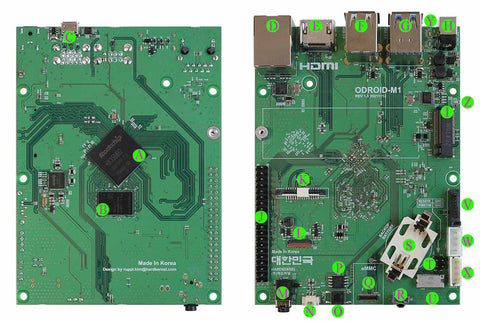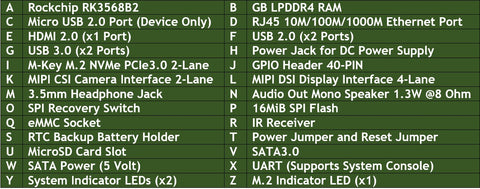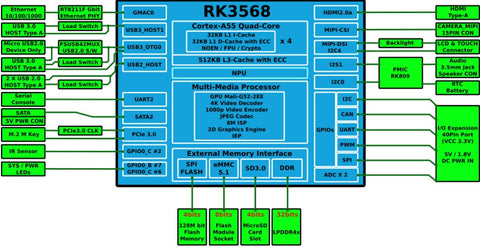Odroid M1 8GB RAM
Download Odroid M1 User Manual and Resources
Odroid M1 features the low-power consumption Quad-Core 2GHz ARM Cortex-A55 processor. This board is based on the Rockchip RK3568B2 System on Chip. It is ideal for a wide range of embedded applications.
Odroid M1 has Mali G52 MP2 650 MHz Graphics Processing Unit and an 8GB LPDDR4 RAM.
Hardkernel has announced that the modified RK3568B2 SoC will remain in production till 2036.
Hardware Layout


Block Diagram 
Odroid M1 Hardware Specifications
Processor
- Rockchip RK3568B2 SoC
- Up to 1.992 GHz
- Quad-Core Cortex-A55
- ARMv8-A Architecture | Supports Neon and Crypto Extensions
- 512 KB L3 Data Cache | 512 Sets (16-Way) | 64 byte lines (used by 4 processors)
- 32 KB L1 Data Cache | 128 Sets (4-Way) | 64 byte lines (used by 1 processor)
- 32 KB L1 Instruction Cache | 128 Sets (4-Way) | 64 byte lines (used by 1 processor)
Neural Processing Unit
- RKNN NPU
- 8T ops @ INT8
- High performance AI accelerator
- Supports one-click switching for Caffe, PyTorch, Darknet, TFLite, TensorFlow, Keras, ONNX
Graphics Processing Unit
- Mali G52 MP2
- x4 Execution Engines
- 650 MHz
RAM
- LPDDR4 RAM 8GB
- Bus width 32-bit
- 3120 MT/s data rate
- Up to 1560MHz
Networking
- Ethernet Transceiver RTL8211F Realtek
- RJ45 LAN Port
- GbE Ethernet 10M / 100M / 1000M
- Amber LED Indicator | Flashes with 1000Mbps connection data traffic
- Green LED Indicator | Flashes with 100Mbps connection data traffic
Storage Support
- Micro SD Card Slot (x1) | DS / HS Mode Support up to UHS-I SDR104
- 2 NVMe SSD (x1) | PCIe 3.0 (x2)
- 0 (x1)
- eMMC Socket (x1)
External Input / Output
- 40-PIN GPIO Header
- Serial Debugging Console (x1) | UART 1.5Mbps N81
- SATA Connector (x1)
- MIPI-DSI 31-Pin Display Interface (x1)
- MIPI-CSI 15-Pin Camera Interface (x1)
- USB 2.0 HOST (x2)
- USB 2.0 OTG (x1) + USB 3.0 HOST (x1) OR USB 3.0 HOST (x2)
Video Support
- HDMI 2.0 Port (x1) | Up to 4K @ 60 Hz | EDID and HDR Support
- MIPI-DSI Display Interface (x1) | Supports up to 800 x 1280p LCD
Audio Support
- Headphone Jack 2.5mm (x1)
- HDMI Sound (x1)
- Mono Speaker Audio Output (x1)
Power Input
- Power Input DC Jack | 2.1mm positive / inner diameter and 5.5mm negative / outer diameter
- DC 7.5V ~ 15.5V Power Supply Compatible
- Power Supply Recommended by Hardkernel: 12V/2A DC with EU Plug / 12V/2A DC with UK Plug
Additional Features
- IR Receiver to support Infrared Remote Controller
- Holder for RTC Backup Battery
- Function Indicator LED (BLUE): Solid stable light during u-boot | Heartbeat flash when Kernel is operational
- Power Indicator LED (RED): Solid stable light when connected to a DC power supply
Dimensions and Weight

- Board Dimensions: 90 x 122 x 16 (mm) | 9 x 12.2 x 1.6 (cm)
- Heatsink Dimensions: 100 x 123 x 19 (mm) | 10 x 12.3 x 1.9 (cm)
- Weight: 253 Grams (Heatsink Included)
Software Compatibility
Ubuntu 22.04 (LTS) and 20.04 (LTS)
- Kernel 4.19.219
- Neural Network APIs and NPU drivers
- Wayland GNOME Desktop Support
- Wayland driver for Mali GPU EGL
- WiringPi library and GPIO drivers
- MIPI CSI and MIPI DSI drivers
According to Hardkernel, the Mainline Kernel will also be available in the future for Odroid M1. This will allow access to the Panfrost driver.
Android 11 (Red Velvet Cake)
- Kernal 4.19.193
- Simultaneous Dual Head Display Support for HDMI and MIPI-DSI
Easy OS and Kernel Installation
- SPI Flash 16MiB comes with the pre-installed Petitboot
- Supports easy management of different Operating Systems and Kernel versions
- Odroid M1 networking features support online Operating System installation
- Supports Operating System boot from eMMC, NVMe, MicroSD, USB, and SATA
M.2 NVMe Storage Support
- Compatible with the standard M.2 NVMe 22mm x 80mm storage device
- PCIe 3.0 2-Lane supports Up to 1600 Mbps sequential access

Note: The M.2 slot supports the M-Key PCIe interface. The M.2 SATA storage device is not compatible with this M.2 Slot.
SSD NAND and HDD Support

- SATA 3.0 (non-USB) port
- 5inch HDD and SSD NAND supported
- Supports up to approximately 500 Mbps sequential access
LCD Connection Example
Check out ODROID-Vu8M TFT Touch LCD for ODROID-M1 (Sold Separately)!
Demonstration of Odroid M1 Neural Networking Processing Unit (NPU) Object Detection
Power Consumption
- Heavy processing load (no external peripherals connected) – Consumes 4.5 Watt only
- Light processing load (no external peripherals connected) – Consumes 1.3 Watt only

Thermal Characteristics
Below is the performance of the Odroid M1 large heatsink

GPIO Pin Definition


Items Included
- Odroid M1 8GB (1)






